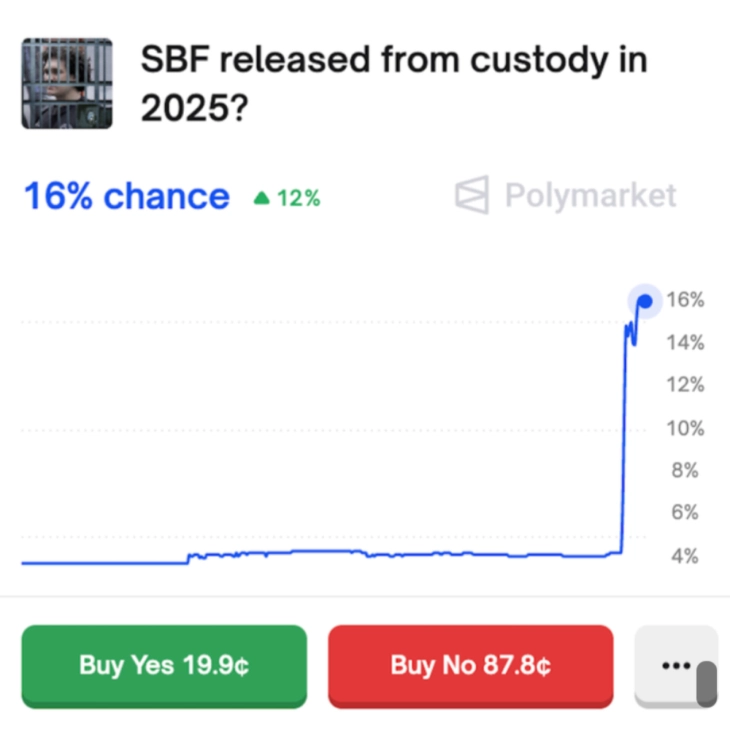Key Highlights
- The leading prediction market, Polymarket’s trade increased the chances of SBF being released to 16%
- This comes after U.S. President Donald Trump pardoned Binance’s founder, CZ
On the leading prediction market, Polymarket’s recent post on Sam Bankman-Fried’s chances of being released from custody by this year has soared to 16% after Trump officially pardoned Binance’s founder Changpeng Zhao.

(Source: Polymarket)
On October 23, White House Press Secretary Karoline Leavitt revealed that CZ has been pardoned by US President Donald Trump. According to her, CZ was wrongly punished by the previous government.
“President Trump exercised his constitutional authority by issuing a pardon for Mr. Zhao, who was prosecuted by the Biden Administration in their war on cryptocurrency,” Karoline Leavitt said.
“In their desire to punish the cryptocurrency industry, the Biden Administration pursued Mr. Zhao despite no allegations of fraud or identifiable victims,” she said.
The main difference between SBF and CZ is in the scale of their wrongdoings. SBF’s actions were deemed predatory theft directly from FTX customers, while CZ was framed as regulatory sloppiness that was swiftly amended.
SBF’s parents, Stanford professors Joseph Bankman and Barbara Fried, are actively exploring a Trump pardon for their son. They have met lawyers in Trump’s orbit, like Kory Langhofer, and lobbyists to build clemency ties.
Can SBF Get Trump’s Pardon Like Binance’s CZ?
The legal trouble for two popular personalities, Sam Bankman-Fried (SBF) and Changpeng Zhao (CZ) is completely different in their influence. While SBF is entangled in appeals against a 25-year prison sentence, CZ has been pardoned by U.S. President Donald Trump. With this, Trump has completely erased CZ’s legal trouble in the U.S.
On the other hand, the downfall of Sam Bankman-Fried (SBF) began with the implosion of his FTX exchange in 2022. It was revealed that his sister’s hedge fund, Alameda Research, has secretly stolen billions of dollars in customer deposits from FTX to cover its own risky financial bets.
SBF founded FTX in 2019, and it rapidly turned into a billion-dollar empire. The cryptocurrency exchange was also hyped by celebrity endorsements and his professed philosophy of effective altruism.
However, federal prosecutors exposed this as a massive fraud, detailing charges of wire fraud, securities violations, and money laundering that collectively defrauded over a million users of $8 billion. Some of his close allies, including his ex-girlfriend Caroline Ellison, testified against him, revealing that SBF directed the scheme and misused customer funds for vast political donations, luxury real estate, and even a Super Bowl advertisement.
SBF’s legal battle was relentless and public. After his arrest in the Bahamas and extradition to the U.S., his 2023 trial in New York featured damning evidence of his lavish spending on private jets and mansions, as well as backdoor code used to facilitate the theft.
The jury swiftly convicted him on all seven counts, rejecting his defense of being a “clueless genius.” The judge sentenced him to 25 years in March 2024 and ordered him to forfeit $11 billion.
Unlike a quiet plea deal, this was a full spectacle that amplified outrage over the losses suffered by investors. SBF continues to fight his case from a low-security prison, with an appeal set for November 2025, where he will argue the jury misunderstood FTX’s financial state.
On the other hand, Changpeng Zhao’s path was a model of calculated contrition. His company, Binance, faced scrutiny for severe anti-money laundering lapses, which allowed transactions for sanctioned entities and drug cartels to flow through its platform.
On November 20, CZ pleaded guilty to a single charge, and Binance agreed to pay a monumental $4.3 billion in fines. CZ resigned as CEO but retained control of the company and his vast personal fortune. His personal sentence was only 4 months, which he served with minimal disruption.



